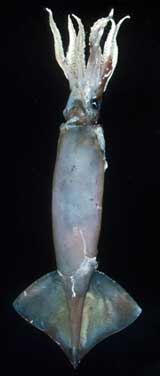Scientists predict slump in Falklands squid stocks

<i>Illex argentinus</i> <br>© BAS Press Office
Record low numbers of highly-prized squid have devastated the Falkland Islands fishery this year. Less than 10,000 tonnes have been caught so far, making this the worst year since the fishery began in 1987. As described in this week`s SCIENCE British Antarctic Survey (BAS) scientists believe unfavourable oceanographic conditions in squid spawning grounds caused the slump in the fishery which is normally worth £17 million ($US 25 million) in licence fees.
The flying squid Illex argentinus breeds close to South America`s Plate River estuary during June and July. During the following six months young squid make the 1000km journey to feeding grounds off the Falkland Islands in the South Atlantic where they are fished commercially by vessels mainly from East Asia. Squid live for only one year and the number entering the fishery each year is highly variable.
By comparing oceanographic and environmental conditions with squid abundance, scientists have developed a model to predict potential stocks each year. The model suggests that when ocean temperatures in spawning grounds are relatively cool (14°C) greater numbers of squid larvae survive before migrating south to the Falkland Islands. In years when ocean temperatures are warmer (18°C) fewer larvae survive. BAS scientists conclude that cooler conditions produce better catches the following year. BAS biologist Dr Claire Waluda found sea surface temperatures in the nursery grounds to be 1.5ºC warmer than average during June and July 2001. The BAS model predicted a very low catch of 73,000 tonnes for 2002, where an exceptionally good year can yield over 250,000 tonnes.
She says, “The squid fishery around the Falkland Islands usually runs from March-June, and targets adult squid as they enter these waters to feed. As squid only live for one year, the fishery is highly variable from year to year, which makes sustainable management of stocks challenging. Our research, although at an early stage, has the potential to predict available stocks before the start of each fishing season and help improve forecasting for the fishery.”
Media Contact
All latest news from the category: Ecology, The Environment and Conservation
This complex theme deals primarily with interactions between organisms and the environmental factors that impact them, but to a greater extent between individual inanimate environmental factors.
innovations-report offers informative reports and articles on topics such as climate protection, landscape conservation, ecological systems, wildlife and nature parks and ecosystem efficiency and balance.
Newest articles

Durable, Efficient, Sustainable: The Rise of Cerium Oxide Thermal Switches
Groundbreaking cerium oxide-based thermal switches achieve remarkable performance, transforming heat flow control with sustainable and efficient technology. Cerium Oxide-Based Thermal Switches Revolutionize Heat Flow Control Thermal switches, which electrically control…

How Industrial Robots are Reducing Emissions in Global Manufacturing
A new study explores the intersection of industrial automation and environmental sustainability, focusing on the role of industrial robots in reducing the carbon intensity of manufacturing exports. The research demonstrates…

Patients Can Heal Through Precise, Personalized Bioceramic Grafts
A recent review is transforming the landscape of craniomaxillofacial bone regeneration with the introduction of personalized bioceramic grafts. This pioneering research explores the fabrication and clinical potential of synthetic grafts…



